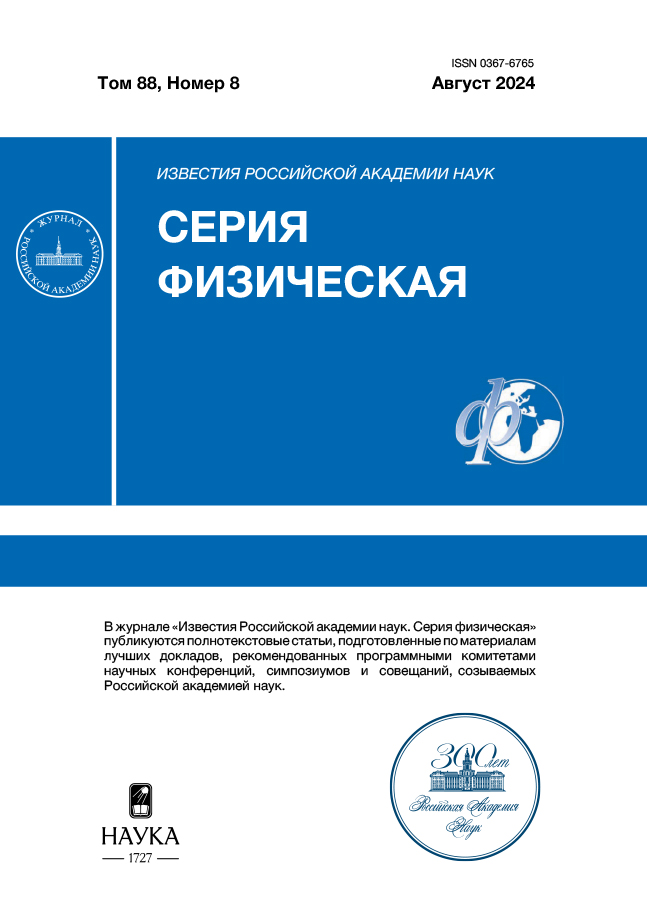Hardware implementation and testing of 4-channel fast electronics for a MCP detector
- Autores: Valiev F.F.1, Kalinichenko N.I.1, Makarov N.A.1, Feofilov G.A.1
-
Afiliações:
- Saint-Petersburg State University
- Edição: Volume 88, Nº 8 (2024)
- Páginas: 1305-1311
- Seção: Fundamental problems and applications of physics of atomic nucleus
- URL: https://edgccjournal.org/0367-6765/article/view/676764
- DOI: https://doi.org/10.31857/S0367676524080231
- EDN: https://elibrary.ru/OOWRTW
- ID: 676764
Citar
Texto integral
Resumo
Using the Quartus software environment, simulation of time measurements for a fast collision monitor of particle beams based on chevron MCP assemblies was carried out. The measurement algorithm is based on the delayed coincidence method. 4-channel electronics for a detector on microchannel plates (MCP) based on high-speed comparators and FPGA EPM240 from ALTERA have been created. The test prototype was tested using a 4-channel nanosecond pulse generator, with an adjustable delay between channels. When using these comparators and FPGAs, it is possible to determine the time of registration of particles by a detector with an error of 100 ps, while the calculated speed of the reading circuit coincides with the measured one and is no more than 10 ns for each event for a 4-channel system.
Palavras-chave
Sobre autores
F. Valiev
Saint-Petersburg State University
Email: n.a.makarov@mail.spbu.ru
Rússia, St. Petersburg, 199034
N. Kalinichenko
Saint-Petersburg State University
Email: n.a.makarov@mail.spbu.ru
Rússia, St. Petersburg, 199034
N. Makarov
Saint-Petersburg State University
Autor responsável pela correspondência
Email: n.a.makarov@mail.spbu.ru
Rússia, St. Petersburg, 199034
G. Feofilov
Saint-Petersburg State University
Email: n.a.makarov@mail.spbu.ru
Rússia, St. Petersburg, 199034
Bibliografia
- Колесников В.И., Зинченко А.И., Васендина В.А. // Изв. РАН. Сер. физ. 2020. Т. 84. № 4. С. 575; Kolesnikov V.I., Zinchenko A.I., Vasendina V.A. // Bull. Russ. Acad. Sci. Phys. 2020. V. 84. No. 4. P. 451.
- Жеребчевский В.И., Мальцев Н.А., Нестеров Д.Г. и др. // Изв. РАН. Сер. физ. 2022. T. 86. № 8. C. 1146; Zherebchevsky V.I., Maltsev N.A., Nesterov D.G. et al. // Bull. Acad. Sci. Phys. 2022. V. 86. No. 8. P. 948.
- Baldin A.A et al. // Nucl. Instrum. Meth. Phys. Res. A. 2020. V. 958. Art. No. 162154.
- Сандул В.C., Феофилов Г.А., Валиев Ф.Ф. // ЭЧАЯ. 2023. Т. 54. № 4. C. 848.
- Галактионов К., Руднев В., Валиев Ф. // ЭЧАЯ. 2023. Т. 54. № 3. C. 560.
- Беспалько В.А. // ПТЭ. 2009. № 2. С. 57.
- Будагов Ю.А., Семан М., Ситар Б. и др. Преобразователь время-код с наносекундным разрешением. Препринт ОИЯИ 13—84—395. Дубна, 1984.
- Абрамов Г.Н. Рециркуляционно-нониусный время-цифровой преобразователь. Патент РФ № 2730125 C1. 2020.
- Гурин Е.И., Коннов Н.Н., Механов В.Б., Попов К.В. // ПТЭ. 1997. № 3. С. 102.
- Букин М.А., Титов В.М. Время-цифровой преобразователь с наносекундным разрешением на основе ПЛИС Altera. Новосибирск: Ин-т ядерн. физики имени Г.И. Будкера СО РАН, 2001.
- Sanoa Y., Horiia Y., Ikenob M. et al. // Nucl. Instrum. Meth. Phys. Res. A. 2017. V. 874. P. 50.
- Liu C., Wang Y. // IEEE Trans. Nucl. Sci. 2015. V. 62. No 3.
- https://www.intel.ru/content/www/ru/ru/software/programmable/quartus-prime/overview.html
Arquivos suplementares










